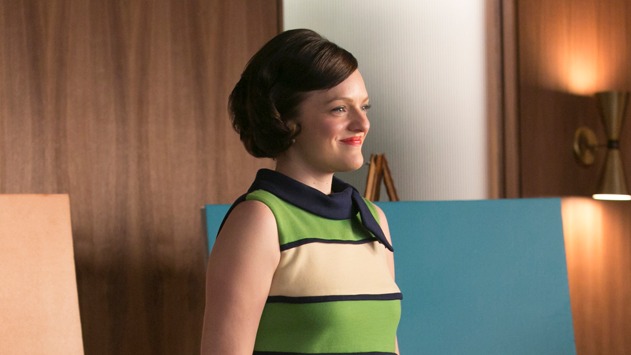For all that the AMC series Mad Men gets wrong about desire, they know this to be true: to be human is to want.
Set in the '60s, the show thrives on "the drinking, the smoking, the lack of seat belts — [the dark appeal] of living without boundaries." At the end of the first half of their final season, Peggy Olson, who's risen to copy chief, is turning 30. Though she's turned down convention for career, and like Don Draper, lived by her desires, she wonders: Were those the right choices?
Mad Men is not a show you have to watch in order to understand its premise. It peddles very familiar cultural formulations of desire and want.
"Trying to match your desires to a vague notion of the ideal is exhausting — and you can, in fact, listen to what your mind and body seems to be yearning for instead of battling to shut it up," writes Anne Helen Peterson. In her essay, "What Peggy Olson Has Taught Me About Doing It My Way," Petersen admires Peggy for having resisted the "Greek chorus, constantly reminding Peggy that she made all the wrong choices." She's done it her way. Peggy may never have the happiest life, but even if she is miserable, at least it will be the misery of her own choosing. Peggy's courage—to want—must be bravely imitated.
There's something inviting about the Mad Men world: that we should live by our desires, that our desires express our most authentic selves, that it doesn't matter what anyone else thinks or expects. Isn't it great that Peggy is free to want? In fact, isn't she most free when she wants?
But of course this is the virtue of "being true to yourself"—which wasn't included when Jesus was asked to identify the greatest command in the Law (cf. Matt. 22:36-40).
Recently, I've been teaching a class on desire at my church as my book on the subject, Teach Us to Want, nears its release. At the first session, I showed a clip from Mad Men, launching a conversation about how the culture teaches us to want.
We summarized the culture's messaging on desire: If it feels good, do it. Desire can't be repressed; it has to be expressed. Nothing you want is ever wrong.
And then the church's: If it feels good, don't do it. Desire is evil. The highest calling in the Christian life is sacrifice.
No wonder desire has been my greatest confusion as a Christian. I've known that my life with Jesus required surrender. So what did I do with my wanting? Was it always evil?
The uncertainty probably has something to do with the way my story of faith began. My conversion to Jesus, at the age of 16, played like a homecoming. After my prodigal return, it felt immediately necessary to give up on desire. Hadn't it been the very thing that had recklessly gotten me into trouble?
Then there's my life now: I'm a wife and mother and church staffer. Where does desire fit into the sense of being on call for everyone else's emergency? On being readied for the desires of those I love? And most of all, if I'm following the One who "made himself nothing, taking the form of a servant [and]… humbled himself by becoming obedient to the point of death, even death on a cross" (Phil. 2:7, 8), how can it ever be right to insist on something I want?
It has long seemed necessary to resist desire as a trap. I've read Scripture as a cautionary tale of desire; I've formulated the cross of Jesus Christ as the ultimate denial of desire. Desire was eliminated from the holiness equation.
These were the half-truths I told myself, and like half-truths often do, they worked for a time—except when I wanted to pray. Really pray. It may never have seemed safe to trust my desires. But I wasn't sure how to pray without them.
"What do you want?" was a question that Jesus loved to ask of people. There may have been many reasons behind his question. Maybe, by having them name their desires, Jesus was also nudging them to identify the hesitations and fears that obstructed their transformation. Maybe Jesus was calling the sin and sin-sick into the necessary commitment that change always requires of us as we participate with God. But no doubt Jesus was putting before them a great risk, the risk that is involved in prayer at its best: to admit our desires and believe that God wants something for our great good.
To be human is to want, and to want requires courage. It's not Peggy's courage we need, though. We need the courage to surrender to God's will. We need the courage to risk on God's goodness. We need the courage to pray as Jesus says we should when he describes the man, who won't quit knocking at his neighbor's door at midnight until his neighbor is out of bed and heeding his request for bread (cf. Luke 15). We need Biblical courage.
And holy desire.
But even if the Bible inspires a call to desire, it also issues a caution. We aren't brave and virtuous to live only by our desires. Indeed, as Paul describes so eloquently describes in Romans 7, on this side of heaven, we're still suffering the catastrophe of our contradictions. We commit the evil we hate and neglect the good that we love. Honestly, there is still so much work to do—in the reformation of our desires.
Finally, though, I've begun to realize this: it is a work that continues by grace through faith.
"Wretched man that I am! Who will deliver me from this body of death? Thanks be to God through Jesus Christ our Lord!" (Rom. 7:24, 25).









